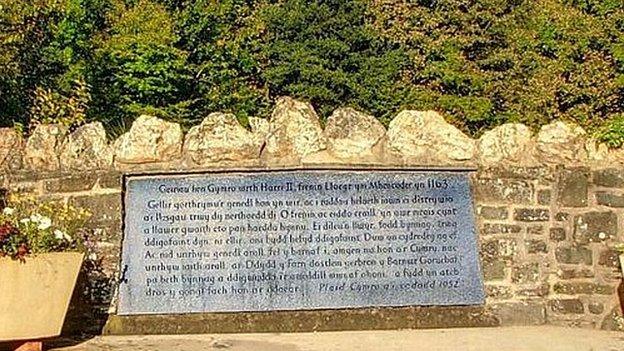Welsh Questions: steel - and the old man of Pencader
- Published
- comments

A plaque bearing the reported words of the old man of Pencader, paraphrased in Parliament.
Steel dominated Wednesday's questions to the secretary of state for Wales in the House of Commons: the explosion at Celsa Steel UK in Cardiff and the serious economic challenges facing the industry.
Shadow Welsh Secretary Nia Griffith challenged Stephen Crabb over UK government support for the industry: "You know just how serious the crisis facing the steel industry in Wales is and indeed in the whole of the UK. Four years ago, the chancellor promised a compensation package to the energy-intensive industries.
"What reassurance can you now give the thousands of workers in Wales whose jobs depend on the steel industry that your government will deliver that package by the end of this month?"
Mr Crabb told her: "The steel industry in Europe is facing a perfect storm as a result of a glut of cheap imports, falling prices and high energy costs. With nearly half of the UK's primary steel industry employed in Wales we fully recognise the impact of these global challenges on Welsh steelworkers and their families.
"We are working closely with the industry and with the devolved administrations to do everything possible to support the industry at this time."
Mr Crabb said the government was in the process of delivering that compensation. "We have already paid out around £50 million in compensation to British steel companies, not least to companies based in Wales."
Whenever two or three Welsh MPs are gathered together it is traditional, if not compulsory, for them to debate the future of devolution and so it proved at the first question time since the draft Wales Bill, external was published.
Plaid Cymru's parliamentary leader, Hywel Williams, wanted to know what progress Mr Crabb had made consulting civil society on the draft bill.
Mr Crabb said he continued to meet "members of civil society, the judiciary and leading business organisations across Wales to take soundings and hear their views".
Mr Williams, who had clearly been taking his own soundings in civil society, warned him: "There is general, substantial and growing dissatisfaction with the draft Wales bill, not least among legal colleagues. Would you not be better advised to withdraw the bill and start again?"
'Pencader'
Mr Crabb was not for turning: "I fear that if we were to withdraw the bill, we would see no progress whatsoever on strengthening and clarifying Welsh devolution, which I understood Plaid Cymru and the Labour Party supported."
Enter Michael 'my mam's from Aberavon' Fabricant : "When I raised this issue before the general election, a previous secretary of state for Wales said that I was wrong. Will the present Welsh secretary say that if the Welsh people would like a Welsh parliament, rather than a Welsh assembly, they will be able to have one?"
Stephen Crabb, a reader of Gerald of Wales's works, told him: "To paraphrase the famous old man of Pencader, it will be the Welsh people ultimately who determine the direction and pace of Welsh devolution. The draft Wales bill will give powers to the Welsh assembly to call itself a parliament and take on more law-making responsibilities."
Mr Crabb rejected calls for a single Welsh legal jurisdiction, warning that it could lead to "a flight of talent" from the Welsh legal profession.
You can read the full exchanges here, external.
In other news, Jeremy Corbyn has continued on his "steep learning curve" as Labour leader, with some frontbench spokespeople continuing to question openlyhis leadership and policies.
One Labour activist, Madeleine Jennings, who works for Aberavon MP Stephen Kinnock, tweeted, external: "Pretty embarrassing week 2 b Labour Party member. Parisians must see our party spat over their national tragedy & think we're total morons."